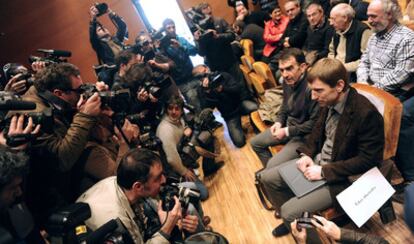Batasuna announces it will reject "violence and any type of threats"
Government to study charter before deciding on legalization, but Popular Party set against party running in May elections
Following the presentation of a "new" Batasuna whose charter for the first time expressly rejects ETA's violence, the government said it will examine the document to establish whether it meets Party Law criteria. If so, the former political wing of the terrorist organization could be allowed to run in the local elections of May 22, after being banned from the successive elections during the past decade.
"There have been many years of violence," said Interior Minister Alfredo Pérez Rubalcaba, whose department runs the party register where Batasuna will seek to sign up on Wednesday as a legitimate political party. "Batasuna's credibility is what it is: at a historical low. I don't want anyone to forget that ETA has not declared an end to violence. Law enforcement agencies are still working to achieve the end of ETA."
But Rubalcaba also said that "this is the first time in many years" that Batasuna has made a clear statement rejecting the use of violence to achieve political goals. The new Batasuna charter was officially presented in Bilbao by the radical leader Rufi Etxeberria, a historical figure in pro-ETA circles, and by the lawyer Iñigo Iruin.
Iruin read out several paragraphs of the charter to prove the group's new commitment to peaceful politics. One of the paragraphs expresses Batasuna's desire to contribute "to the definitive and total disappearance of any kind of violence, particularly that of ETA."
The new party also commits to "preventing its own instrumentalization by organizations that exercise violence or by parties that were outlawed because of their collusion with it."
Up to four paragraphs mention ETA, although the wording always refers to "multiple violence," hinting at Batasuna's long-held claim that the government also uses violent methods in the form of keeping ETA inmates in prisons outside the Basque Country rather than closer to home.
Ever since the Socialist Party won the 2009 regional elections, ending the decades-long rule of the Basque Nationalist Party, Batasuna has sought to return to the polls by distancing itself from ETA.
Reaction from other parties was skeptical. The Socialist Party's organization secretary, Marcelino Iglesias, said that "democracy has to be very demanding of these groups after so many years of supporting violence." The Popular Party said that the government should not let Batasuna run. Its deputy secretary for communication, Esteban González Pons, said that "as long as ETA exists, no matter what Batasuna says, it cannot become legal."

Tu suscripción se está usando en otro dispositivo
¿Quieres añadir otro usuario a tu suscripción?
Si continúas leyendo en este dispositivo, no se podrá leer en el otro.
FlechaTu suscripción se está usando en otro dispositivo y solo puedes acceder a EL PAÍS desde un dispositivo a la vez.
Si quieres compartir tu cuenta, cambia tu suscripción a la modalidad Premium, así podrás añadir otro usuario. Cada uno accederá con su propia cuenta de email, lo que os permitirá personalizar vuestra experiencia en EL PAÍS.
¿Tienes una suscripción de empresa? Accede aquí para contratar más cuentas.
En el caso de no saber quién está usando tu cuenta, te recomendamos cambiar tu contraseña aquí.
Si decides continuar compartiendo tu cuenta, este mensaje se mostrará en tu dispositivo y en el de la otra persona que está usando tu cuenta de forma indefinida, afectando a tu experiencia de lectura. Puedes consultar aquí los términos y condiciones de la suscripción digital.








































